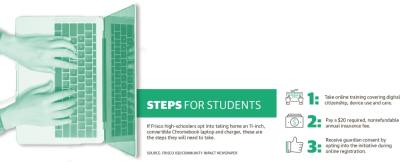This is due to FISD’s 1 For All initiative, which aims to provide the opportunity for every high school student to have a take-home device. By the 2023-24 school year, district officials said this should be a reality, as each subsequent freshman class will be presented with the take-home device option as well.
“It’s really about the learning and how teachers are going to be freed up to design all different kinds of lessons and learning for kids that they weren’t able to in the past,” FISD Chief Technology Officer Melissa Fouche said.
A Chromebook is a laptop that operates on the cloud-based Chrome operating system and uses Google Apps for Education, such as Google Drive, Docs and Sheets.
Since FISD has been using Google Apps over the last eight years, FISD Director of Digital Learning Cheryl McDonald said Chromebooks made the most sense when deciding on the take-home device.
“There’s some devices that you’re kind of getting more than you need,” McDonald said. “Really, most of our students just need a browser.”
Funding for the 1 For All initiative comes from the district’s 2018 bond, Fouche said, which put $70 million toward technology over the next five to six years.
FISD has a history of using Chromebooks at all levels for school-day use, McDonald said, since teachers can check out carts of Chromebooks for their classrooms. iPads and computer labs with PCs are also available for teacher checkout at all levels. Mac computer labs can be found at FISD high school campuses.
McDonald added that Chromebooks ended up being the more economical option for the district as well.
Students will be able to keep their devices with them over the summer, McDonald said, which can benefit students taking online summer or dual-credit courses.
McDonald said the devices will still have the same browsing filters that blocks students from certain websites when used at home.
Chromebooks will continue to use management systems, such as Canvas, McDonald said. The 1 For All initiative will also help start conversations with students about their digital footprint, she said.
“It’s also an opportunity for us to work to teach them about digital citizenship,” McDonald said.
Students with a take-home Chromebook will pay a $20 yearly fee for breakage, replacements and insurance, McDonald said.
“This $20 fee—we don’t want that to be a barrier, but at the same time, this whole initiative is optional,” said Teri Essy, FISD coordinator of secondary instructional technology. “They’re not required to take the Chromebook home.”
Essy said students will still be allowed to bring their own devices to class.
Each high school campus will come with a tech depot for students to bring broken devices for repair or assistance, Fouche said.
When a device is being repaired or is lost, students will be given a replacement Chromebook that is not touchscreen or convertible, Fouche said.
Incoming freshmen and teachers alike will begin training this spring to prepare for the program’s 2020-21 rollout, McDonald said.
She said teachers are excited to offer different kinds of lessons for their students: lessons with a focus on student creation.
“We feel like it’s a real opportunity to get really personalized learning,” McDonald said, “and [to] really, thoughtfully use a device [that is] not just for students to consume.”






